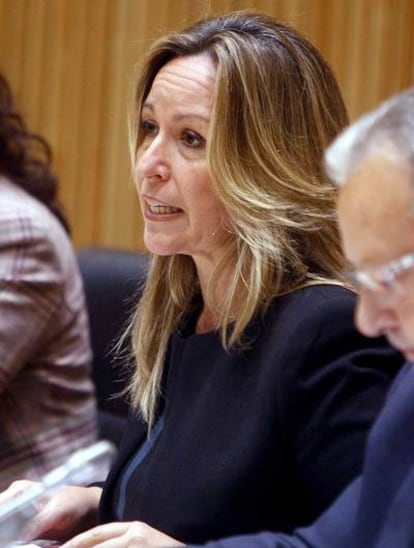Jiménez denies Spain is weighing interests over rights with Morocco
Independent probe on Western Sahara needed before stance, says Jiménez
Foreign Minister Trinidad Jiménez categorically denied on Thursday that the Spanish government has avoided condemning Morocco for the violence in Western Sahara because it wants to protect Spain's economic interests with its North African neighbor.
Appearing before the congressional foreign relations committee, Jiménez responded to a charge made by United Left (IU) deputy Gaspar Llamazares, who accused the government of engaging in "double talk."
"I take caution on all sides before I render an opinion or make an evaluation," the foreign minister said. "Until we have precise knowledge of what happened, I do not want to give the government's final answer."
Jiménez said that she wanted "a clear and independent" inquiry into the events surrounding the November 8 forced eviction by Moroccan security forces of a protest camp outside the Western Sahara capital Laâyoune. The incident set off three days of riots in the city in which some sources say as many as 19 people were killed and 200 more detained.
"It is necessary that the international community, with precise and factual information through a clear and independent report, knows what occurred before a final statement can be issued," Jiménez said. She didn't tell committee members which international agency should conduct the inquiry.
Jiménez added that she is expecting to hear word "very soon" from Morocco over the Spanish government's request to allow reporters to travel to Western Sahara. Rabat has ordered a news blackout, even expelling Spanish reporters after they have reached Laâyoune. Morocco has accused some Spanish media of fomenting hate against Moroccans.
Meanwhile, two pro-Sahrawi activists, who had been hiding out in Laâyoune since the camp expulsions, arrived in the Canary Islands on Wednesday. Isabel Terraza and Antonio Velázquez, a Mexican national, were able to leave Western Sahara under the protection of the Foreign Ministry.
Moroccan police had accused Velázquez of killing an officer, telling him his passport and clothes, which he left behind at the protest camp when he escaped, were covered with blood.
Mariano Collado, who is responsible for Spanish heritage in Western Sahara, was able to help negotiate the two activists' passage from the country.
Terraza and Velázquez told reporters that they had been hiding out in an abandoned house in Laâyoune for eight days. According to the couple, they heard people being "tortured at night, doors being kicked in, and screams of pain."
Terraza said that during a phone conversation with Foreign Minister Jiménez she told her: "I wish you were here too so you could understand what I mean about deaths and tortures."
Meanwhile, the People's Party and Socialists in the European Parliament decided to postpone the presentation of a measure asking for a resolution against Morocco until next month. Other minority parties lamented that the parliament appeared to be buckling under pressure from Rabat.

Tu suscripción se está usando en otro dispositivo
¿Quieres añadir otro usuario a tu suscripción?
Si continúas leyendo en este dispositivo, no se podrá leer en el otro.
FlechaTu suscripción se está usando en otro dispositivo y solo puedes acceder a EL PAÍS desde un dispositivo a la vez.
Si quieres compartir tu cuenta, cambia tu suscripción a la modalidad Premium, así podrás añadir otro usuario. Cada uno accederá con su propia cuenta de email, lo que os permitirá personalizar vuestra experiencia en EL PAÍS.
¿Tienes una suscripción de empresa? Accede aquí para contratar más cuentas.
En el caso de no saber quién está usando tu cuenta, te recomendamos cambiar tu contraseña aquí.
Si decides continuar compartiendo tu cuenta, este mensaje se mostrará en tu dispositivo y en el de la otra persona que está usando tu cuenta de forma indefinida, afectando a tu experiencia de lectura. Puedes consultar aquí los términos y condiciones de la suscripción digital.








































